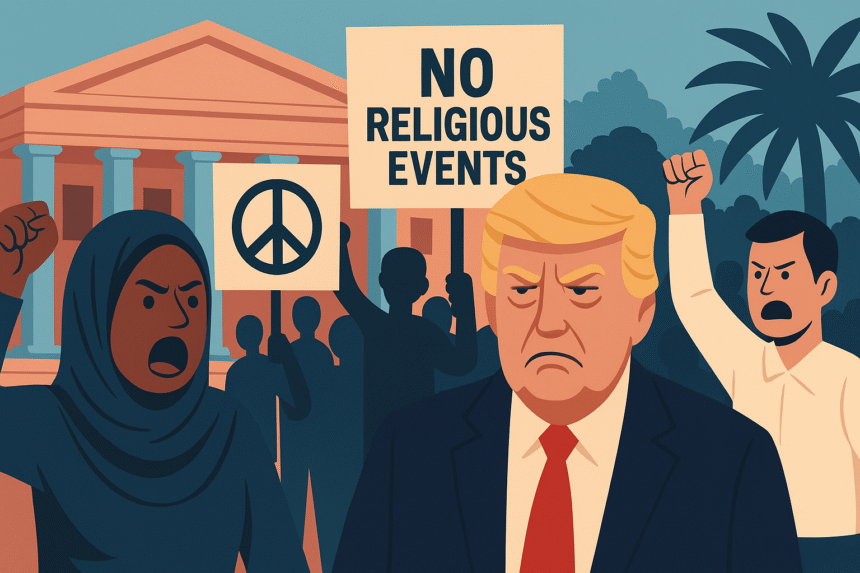Not often does a small town make waves across an entire nation. But Jumilla, in southeastern Spain, just did. Its local council has enacted a ban on religious events in public sports facilities. Though it’s framed as neutral regulation, it directly affects the Muslim community—and has been slammed as Islamophobic.
- The Ban: What’s Happening in Jumilla?
- Who Pushed This? Political Roots Explored
- Critics Speak Up
- Jumilla Council Responds: “No Religious Veto Here”
- The Human Angle: Isolating a Community
- Why It Matters Beyond Jumilla
- A Larger Debate: Freedom, Secularism, and Culture
- Wrapping It Up: Why the Jumilla Ban Matters Now
The Ban: What’s Happening in Jumilla?
Jumilla’s council recently passed a rule that restricts municipal sports centers to sporting activities only or events organized by the city. That means religious gatherings—such as Eid prayers—get kicked out of public spaces they’ve used for years.
Even though the ban doesn’t name any religion, its real-world impact is targeted. The local Muslim community, around 1,500 residents, has used these venues for Eid celebrations for years. Now, they can’t.
Who Pushed This? Political Roots Explored
The measure was introduced by the far-right Vox party and passed with modifications by the conservative People’s Party (PP). Local leader Seve González says it’s all about preserving tradition—not discrimination.
On the other hand, critics call it a thinly veiled attack. A Vox spokeswoman reportedly posted online, “Spain is and always will be a land of Christian roots!” That messaging fuels concerns about intolerance.
Critics Speak Up
The backlash has been swift.
- The national Migration Minister condemned the move as “shameful,” urging local leaders to reconsider.
- Islamic advocacy groups have vowed to challenge the ban legally, calling it a violation of religious freedom.
- Even the Catholic Church has voiced concern, calling the rule discriminatory and contrary to Spain’s cultural heritage.
- The national Ombudsman has opened an official inquiry into the possible breach of constitutional rights.
In short? This is not just a local debate—it’s a national flashpoint.
Jumilla Council Responds: “No Religious Veto Here”
The PP defends the ban, pointing to a constitutional principle: municipal facilities are for sports or city-organized events only. They claim it’s not religious, but based on event policy.
They also highlight Jumilla’s multicultural makeup—over 72 nationalities—and say the measure is fair and neutral, not targeting Muslims.
But critics counter: the world is not so blind. Context and effect matter.
The Human Angle: Isolating a Community
For Jumilla’s small Muslim population—many of them migrant agricultural workers—this isn’t symbolic. It’s deeply personal. Eid celebrations aren’t just prayer—they’re a rare public moment of belonging, of unity, of shared identity.
Stripping that away sends a chilly message: “You don’t belong here.” That’s not faith-neutral. That’s alienation.
Why It Matters Beyond Jumilla
While Jumilla is small, this ban arrives at a fraught time. Across Europe, cultural fault lines are deepening—immigration, religion, identity, and political polarization are never far apart.
This ban adds to the rising chorus of exclusion—whether it’s banning cultural festivals in Madrid or demonizing migrant communities. These incidents fuel a troubling narrative of “us vs. them.”
A Larger Debate: Freedom, Secularism, and Culture
This isn’t just about a sports hall. It’s about Spain’s commitment to freedom of religion, its multicultural identity, and how communities coexist in the public sphere.
When a city shuts down religious celebrations—not in the name of safety or secularism, but cultural “identity”—it enters dangerous territory.
Wrapping It Up: Why the Jumilla Ban Matters Now
- It highlights the thin line between neutral regulation and religious exclusion.
- It exposes how political messaging can weaponize public policy.
- It forces Spain to ask: what values define our shared public spaces?
In Jumilla, the ban might have been legal. But public perception is far stronger than legalese. In the court of conscience and culture, this ban is already losing its case.












